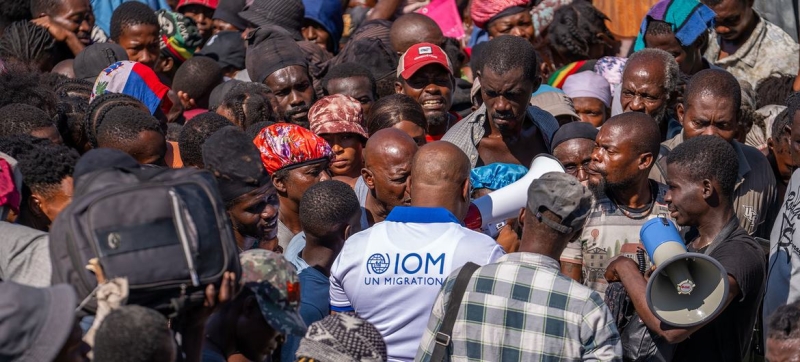
An IOM staff member assesses the needs of internally displaced people. Haiti: Number of internally displaced people exceeds one million Humanitarian aid
More than one million people have been forced to flee their homes in Haiti, according to new figures released by the International Organization for Migration (IOM). The latest estimates put the number of internally displaced people at 1,041,000, many of whom have been displaced more than once.
Over the course of the year, there was a threefold increase in the number of internally displaced persons within the country – from 315 thousand people in December 2023 to more than a million. More than half of them are children.
Growing Health and Safety Risks
In the Haitian capital of Port-au-Prince alone, the number of displaced people has almost doubled due to persistent gang violence, the collapse of vital services, especially health care, and food shortages.
“We must work together to address the causes of violence and instability that have led to so much death and destruction,” said IOM Director Amy Pope.
Many displaced people are fleeing Port-au-Prince to the outside world, leaving host communities under-resourced. The crisis has been exacerbated by the deportation of 200,000 Haitians from other countries to their home country last year, further straining the country’s social services.
The number of camps for displaced people, particularly in the capital, has increased significantly in the past year, from 73 to 108. These camps are overcrowded and lack basic services. Deteriorating conditions are reported, with many families living in makeshift shelters.
Humanitarian Aid and Investment
Despite the challenges, IOM continues to provide assistance to displaced people. “Our teams are on the ground every day providing access to clean water, healthcare and shelter, but needs are growing rapidly,” said IOM Haiti Head of Mission Gregoire Goodstein.
In 2024, the organization provided 18 million liters of clean water to camp residents and rehabilitated water pumps in affected communities. Blankets, water containers, solar lamps and hygiene kits were distributed. In addition, 75,000 people received services including resettlement assistance, rental subsidies, medical and psychological support.
IOM stresses the need to continue humanitarian assistance and long-term investments in governance, security and social cohesion.
